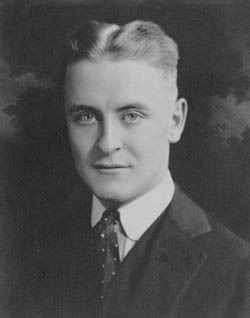
American short-story writer and novelist, known for his depictions of the Jazz Age (the 1920s). With the glamorous Zelda Sayre (1900-48), Fitzgerald lived a colorful life of parties and money-spending. At the beginning of one of his stories Fitzgerald wrote the rich "are different from you and me". This privileged world he depicted in such novels as THE BEAUTIFUL AND DAMNED (1922) and THE GREAT GATSBY (1925), which is widely considered Fitzgerald's finest novel.
"It was my first inkling that he was a writer. And while I like writers - because if you ask a writer anything, you usually get an answer - still it belittled him in my eyes. Writers aren't people exactly. Or, if they're any good, they're a whole lot of people trying so hard to be one person. It's like actors, who try so pathetically not to look in mirrors. Who lean backward trying - only to see their faces in the reflecting chandeliers." (from The Last Tycoon, 1941)
F. Scott Fitzgerald was born in St Paul, Minnesota of mixed Southern and Irish descent. He was given three names after the writer of The Star Spangled Banner, to whom he was distantly related. His father, Edward Fitzgerald, was a salesman, a Southern gentleman, whose furniture business had failed. Mary McQuillan, his mother, was the daughter of a successful wholesale grocer, and devoted to her only son. The family moved regularly, but settled finally in 1918 in St. Paul. At the age of 18 Fitzgerald fell in love with the 16-year-old Ginevra King, the prototype of Daisy Buchanan of The Great Gatsby.
The Great Gatsby
In 1922, F. Scott Fitzgerald announced his decision to write "something new--something extraordinary and beautiful and simple + intricately patterned." That extraordinary, beautiful, intricately patterned, and above all, simple novel became The Great Gatsby, arguably Fitzgerald's finest work and certainly the book for which he is best known. A portrait of the Jazz Age in all of its decadence and excess, Gatsby captured the spirit of the author's generation and earned itself a permanent place in American mythology. Self-made, self-invented millionaire Jay Gatsby embodies some of Fitzgerald's--and his country's--most abiding obsessions: money, ambition, greed, and the promise of new beginnings. "Gatsby believed in the green light, the orgiastic future that year by year recedes before us. It eluded us then, but that's no matter--tomorrow we will run faster, stretch out our arms farther.... And one fine morning--" Gatsby's rise to glory and eventual fall from grace becomes a kind of cautionary tale about the American Dream.
It's also a love story, of sorts, the narrative of Gatsby's quixotic passion for Daisy Buchanan. The pair meet five years before the novel begins, when Daisy is a legendary young Louisville beauty and Gatsby an impoverished officer. They fall in love, but while Gatsby serves overseas, Daisy marries the brutal, bullying, but extremely rich Tom Buchanan. After the war, Gatsby devotes himself blindly to the pursuit of wealth by whatever means--and to the pursuit of Daisy, which amounts to the same thing. "Her voice is full of money," Gatsby says admiringly, in one of the novel's more famous descriptions. His millions made, Gatsby buys a mansion across Long Island Sound from Daisy's patrician East Egg address, throws lavish parties, and waits for her to appear. When she does, events unfold with all the tragic inevitability of a Greek drama, with detached, cynical neighbor Nick Carraway acting as chorus throughout. Spare, elegantly plotted, and written in crystalline prose, The Great Gatsby is as perfectly satisfying as the best kind of poem.

No comments:
Post a Comment